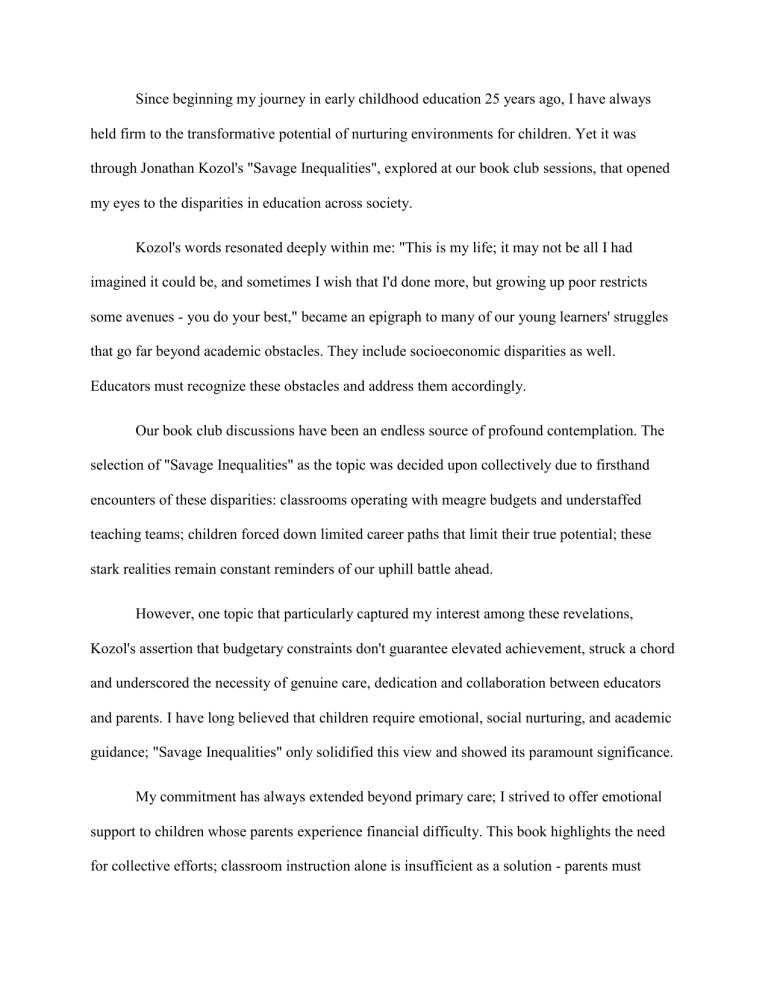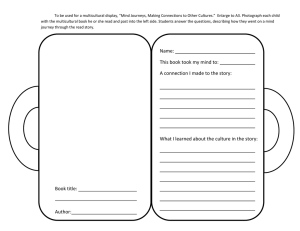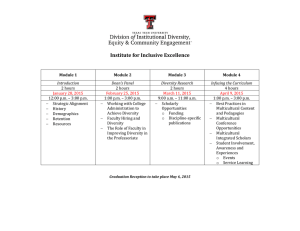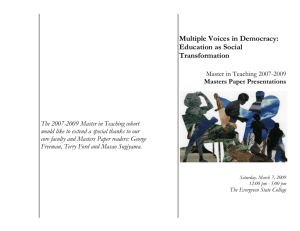Early Childhood Education: Reflections on Inequality & Nurturing
advertisement

Since beginning my journey in early childhood education 25 years ago, I have always held firm to the transformative potential of nurturing environments for children. Yet it was through Jonathan Kozol's "Savage Inequalities", explored at our book club sessions, that opened my eyes to the disparities in education across society. Kozol's words resonated deeply within me: "This is my life; it may not be all I had imagined it could be, and sometimes I wish that I'd done more, but growing up poor restricts some avenues - you do your best," became an epigraph to many of our young learners' struggles that go far beyond academic obstacles. They include socioeconomic disparities as well. Educators must recognize these obstacles and address them accordingly. Our book club discussions have been an endless source of profound contemplation. The selection of "Savage Inequalities" as the topic was decided upon collectively due to firsthand encounters of these disparities: classrooms operating with meagre budgets and understaffed teaching teams; children forced down limited career paths that limit their true potential; these stark realities remain constant reminders of our uphill battle ahead. However, one topic that particularly captured my interest among these revelations, Kozol's assertion that budgetary constraints don't guarantee elevated achievement, struck a chord and underscored the necessity of genuine care, dedication and collaboration between educators and parents. I have long believed that children require emotional, social nurturing, and academic guidance; "Savage Inequalities" only solidified this view and showed its paramount significance. My commitment has always extended beyond primary care; I strived to offer emotional support to children whose parents experience financial difficulty. This book highlights the need for collective efforts; classroom instruction alone is insufficient as a solution - parents must actively be engaged, funding sources improved, and systemic issues within education systems addressed head-on. Reconsidering ongoing issues and emerging trends in education has been an eye-opening journey, leading me to examine my beliefs and values as an educator. When diving deeper into technology integration, multicultural and bilingual education, and student well-being, I am challenged to reevaluate my role in classroom settings. Interacting with multicultural and bilingual education broadened my appreciation of diversity and inclusiveness. Though my childcare business had brought children from diverse backgrounds into contact, this venture demonstrated the significance of instilling global citizenship into young learners. Throughout my explorations, my professional convictions have evolved significantly. Whereas customized education used to be my priority, now I recognize technology's capacity as an instrument to support diverse learning styles - yet traditional teaching methodologies must remain the cornerstones of education for a comprehensive and satisfying educational journey. Realizing the significance of emotional and mental well-being education is the core of my new convictions. In the future, I plan to incorporate emotional intelligence and social skills education heavily into my curriculum; creating safe spaces for children to navigate emotional challenges while being adept at identifying signs of anxiety will play a pivotal role in my classroom practices. Retracing my journey and historical influences, I see remarkable parallels with contemporary teaching and learning approaches. One powerful memory I hold close to is when my mother taught me to read, as literacy became part of her classroom lessons. Being an African-American woman underscores my understanding that education can be a powerful weapon against systemic barriers. With my background in the Native American Boarding School Movement - an initiative to assimilate Native American children into Euro-American culture - I am acutely aware of the perils associated with cultural assimilation. Given today's increasingly multicultural education environment, my commitment to celebrating diversity resonates strongly. Fostering an environment that welcomes differences holds close to my heart. My goal of providing personalized instruction aligns seamlessly with lessons from the Native American Boarding School Movement. This movement taught me to embrace constructivism--an educational philosophy rooted in firsthand experiences as powerful learning tools--which resonates strongly in today's educational landscape, emphasizing personalized learning and constructivist approaches where students actively build knowledge through personal experience - This aligns perfectly with my dedication to providing tailored education solutions explicitly tailored for individual student needs. My approach to early childhood education emphasizes a holistic, integrated methodology that encompasses each child's academic growth and emotional well-being - a process reminiscent of the Native American Boarding School Movement's profound psychological and cultural effects. Knowing that emotional well-being has an enormous impact on academic performance is evident in my commitment to nurturing each child holistically while encouraging academic progress alongside emotional flourishing. Reflections upon past educational movements guide me as I navigate modern teaching/learning paradigms. References Bilingual education prepares children for a multicultural world. (2018, October 18). K-12 Dive. https://www.k12dive.com/news/bilingual-education-prepares-children-for-amulticultural-world/539779/ CCCB. (2019, July 2). Henry Giroux: “All education is a struggle over what kind of future you want for young people" [Video]. YouTube. https://www.youtube.com/watch?v=LCMXKt5vRQk Technology and Young Children: preschoolers and kindergartners. (n.d.). NAEYC. https://www.naeyc.org/resources/topics/technology-and-media/preschoolers-andkindergartners


